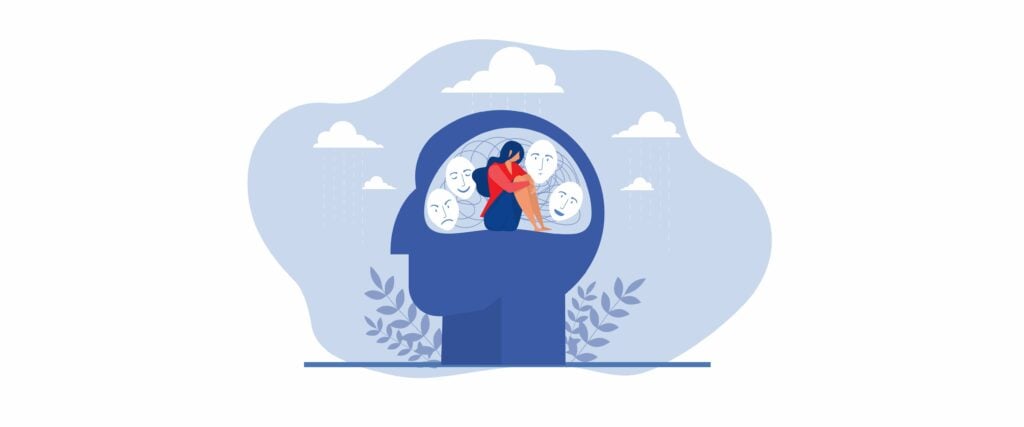Personality types and mental health
Reviewed by Theresa Fry, LPC, NCC, CTP-CE

All personalities are unique, but most can be categorized into a smaller range of different types. Understanding personality type can help you discover new insights about yourself, as well as other people.


What Is Personality?
Personality is a dynamic attribute of your sense of self. It consists of how you think, feel, behave, and interact with others. Genetics, environment, culture, family of origin, and past experiences all contribute to your personality.
A healthy personality is malleable and multifaceted. It may change in response to positive experiences as well as negative stressors. Certain aspects of someone’s personality may be overemphasized or underplayed, depending on the situation. However, most people identify a small group of core personality traits as key to their sense of self.
Different Personality Types
Most personality typing frameworks are descriptive, not prescriptive. That means that they describe certain commonalities experienced by people of a specific personality type; they don’t prescribe rules about what a specific personality type can or can’t do.
Personality typing should offer language to help people understand and share their internal experiences. It should not be used to stereotype or put people into boxes.
The Big Five
Most psychologists use the Big Five personality traits as part of their methodology. Each of the five traits (represented by the acronym OCEAN) exists on a spectrum:
- Openness: Openness measures your willingness to embrace new experiences. People who score high on openness tend to be more creative and receptive to new ideas. People with low openness scores tend to prefer sticking to their routine.
- Conscientiousness: Conscientiousness measures a person’s ability to make a plan and stick to it. People with high conscientiousness scores tend to prefer a methodical approach to work that allows them to focus on details. A low conscientiousness score means you prefer a less structured approach and may struggle with follow-through.
- Extraversion: Extraversion (also spelled as extroversion), measures how outgoing, friendly, and social a person is. People who score high on extraversion are extroverts, and people who score low are introverts.
- Agreeableness: Agreeableness measures how much care people feel for others. High scorers in agreeableness may be idealistic because it suggests that people put others’ needs and happiness ahead of their own. Low scorers in agreeableness may suggest people view others as competitors or even enemies.
- Neuroticism: Neuroticism measures the emotional turbulence a person typically experiences. A high score in neuroticism corresponds with more frequent bouts of moodiness and anxiety. A low score in neuroticism corresponds with higher levels of emotional stability.
Your score for each trait corresponds with another personality term, also known as a facet. The Big Five Inventory (BFI)1 includes 44 different facets of the original five traits. For example, someone with a low conscientiousness score may correspond with being “frivolous,” while a high conscientiousness score would correspond with being “reliable.”
MBTI
MBTI stands for Myers-Briggs Type Indicator. Also known as the 16-personality test, MBTI is based on the work of Katharine Briggs and her daughter, Isabel Briggs Myers. Myers and Briggs based their model on the work of famous psychiatrist Carl Jung.
MBTI types people as one of 16 different personalities, based on four binaries:
- Introversion (I) vs. extroversion (E): Introverts get their energy from solitude, while extroverts get their energy from being around others.
- Intuition (N) vs. sensing (S): Intuitive types value abstract methods to problem solving while sensing types prefer hands-on experiences.
- Thinking (T) vs. feeling (F): Thinkers rely on analytical reasoning, while feelers rely on emotional reasoning.
- Judging (J) vs. perceiving (P): Judging types prefer to follow systems of rules, while perceptive types prefer the freedom to be flexible.
A person’s score on each of the four binaries is represented by a four-letter personality type (for example, an ISFP would be introverted, sensing, feeling, and perceiving). The four binaries allow for 16 different personality types:
- ENFJ: Enthusiastic communicator
- INFJ: Passionate idealist
- ESFJ: Popular altruist
- ISFJ: Caring protector
- ENTJ: Confident leader
- INTJ: Strategic planner
- ESTJ: Dedicated administrator
- ISTJ: Methodical analyst
- ENFP: Joyful seeker
- INFP: Creative peacemaker
- ENTP: Charismatic brainstormer
- INTP: Analytical experimenter
- ESTP: Energetic risk-taker
- ISTP: Inquisitive experiencer
- ESFP: Social improviser
- ISFP: Artistic explorer
MBTI is popular for both personal and professional use. However, it is not often used in therapeutic settings. MBTI relies on binaries instead of spectrums, prioritizing the direction of a personality trait (intuitive vs. sensing) instead of the intensity of it (not intuitive, less intuitive, somewhat intuitive, more intuitive, most intuitive, etc). As a result, MBTI is not as nuanced as more spectrum-based personality frameworks.
Enneagram
The Enneagram is a personality typing framework based on people’s motivations, not just their behaviors. It consists of nine personality types2 that are related to one another in different ways. Each personality type is referred to by its number, as well as a name summarizing the main desire or motivation associated with that type:
- One: The Reformer
- Two: The Helper
- Three: The Achiever
- Four: The Individualist
- Five: The Investigator
- Six: The Loyalist
- Seven: The Enthusiast
- Eight: The Challenger
- Nine: The Peacemaker
The Enneagram symbol is a circle consisting of nine numbers with lines connecting numbers related to one another in times of stress and security. For example, Twos take on the positive aspects of Fours in times of security, but take on the negative aspects of Eights in times of stress.
A person’s personality type may also have a wing, meaning that it takes on some of the aspects of the Enneagram number next to it on the wheel. For example, a Nine on the Enneagram could have an Eight wing (9w8) or a One wing (9w1), depending on if they are more combative like Eights or idealistic like Ones.
Some therapists use the Enneagram to inform their approach to treatment, especially faith-based therapists. The Enneagram is particularly popular in Christian communities in the U.S. and may be used in Christian counseling.
Other Personality Typing Frameworks
There are many other personality frameworks used in personal or professional life. Common ones used in the United States include DiSC® and CliftonStrengths (previously known as StrengthsFinder). Often, these are used in the workplace to help with hiring and team collaboration. They are not typically used in therapeutic settings.
Links Between Personality and Mental Health
Personality and Stress
Stress affects everyone, no matter their personality. However, some personality types may be more prone to stress than others, depending on the situation at hand. Examples based on the different personality typing frameworks include:
- The Big Five: Someone with a low openness score may experience more stress in new or unfamiliar situations than someone with a high openness score.
- MBTI: Introverted personality types may experience more stress in social situations than extroverted personality types.
- Enneagram: Ones may be excited to give their opinion on a topic they’re passionate about, while Fives may feel stressed when asked to share their thoughts.
Can Stress Change Your Personality?
Stress can affect how you behave and express yourself. For example, high levels of workplace stress may affect how you interact not just with your coworkers, but also with your family at home. Some personality typing frameworks, such as the Enneagram, take into account how stress can affect your personality: Threes, for example, are driven by achievement, but they take on the passivity of Nines when stressed.
Some kinds of stress can have a temporary or lasting effect on someone’s personality. Routine stressors, such as making dinner or going to work, are unlikely to result in personality changes. Disruptive stressors, such as an unexpected illness or injury, may cause temporary personality changes that are likely to dissipate once the stressor is resolved. Traumatic stressors, such as surviving an assault or natural disaster, may cause more permanent changes to someone’s personality that may only be resolved through professional mental health treatment.
Personality and Depression
Some personality types are more prone to depression than others. Psychologists may use the Big Five personality traits to determine a person’s tendency toward emotional distress and depression. In particular, those who have high scores in neuroticism have been found to respond to stress with “clinically significant levels of depression.”
Some people associate depression with specific personality types, often relying on stereotyping to do so. Fours on the Enneagram, for example, are often associated with moodiness and depression. However, depression can occur in anyone, no matter their personality type. Stereotypes do not mean that depression is normal or unavoidable for certain personalities.
Personality and Anxiety
Both nature and nurture play a role in the development of personality. Someone may be born with a genetic predisposition toward shyness, for example, but may become more confident if taught how to socialize in group sports or clubs at a young age.
This is also true for mental illness. A person may be born with a predisposition toward anxiety, but genetics aren’t destiny. If that person is raised in a loving home in which it is okay to try and fail, their anxiety may never fully emerge. Conversely, if that person is raised in a home that demands perfection and punishes failure, they may develop an anxiety disorder to cope with the pressure.
Certain personalities are associated with anxiety more than others. For example, people with anxiety often score highly in conscientiousness, taking their desire for careful planning to the extreme. Ones on the Enneagram may be more prone to anxiety disorders like obsessive-compulsive disorder (OCD) as they try to ensure that the way they are living is “right.”
However, it’s important to note that, just like with depression, anxiety is a mental illness, not a personality trait. Living with extreme or constant anxiety is not normal for any personality.
Mental Illness & Personality
What Is a Personality Disorder?
Personality disorders are characterized by pervasive and enduring patterns of thinking, feeling, and behaving that lead to significant distress or impairment in a person’s life. There are three main types of personality disorder, known as clusters, each marked by certain characteristics:
- Cluster A: Suspicion and eccentricity
- Cluster B: Unpredictability and instability
- Cluster C: Extreme anxiety and fear
Common personality disorders include:
- Borderline personality disorder (BPD)
- Antisocial personality disorder (ASPD)
- Narcissistic personality disorder
- Dependent personality disorder
Can Mental Illness Change Your Personality?
Mental illness of any kind may change how you think, behave, and express yourself. Your personality may be affected by a mental health disorder, even if it is not specifically a personality disorder.
Is It Your Personality or Mental Illness?
It can be difficult to determine whether or not your thoughts and behaviors are affected by mental illness. Personality tests can identify and provide language for your behaviors and motivations, but they cannot do the work of treatment that professional therapy can. A therapist can help if you think your thoughts, feelings, or behaviors may be unhelpful or harmful to yourself or others,
Personality-Informed Therapy
Many therapists use personality types to help inform their treatment plans. Browse our directory to find a therapist near you who can help you understand your mental health in the context of your personality.
If you or someone you love is suffering from a personality disorder, consider the following effective therapies:
- Cognitive behavioral therapy (CBT)
- Acceptance & commitment therapy (ACT)
- Dialectical behavioral therapy (DBT)
- Interpersonal psychotherapy
- Psychodynamic therapy

About the author
The editorial team at therapist.com works with the world’s leading clinical experts to bring you accessible, insightful information about mental health topics and trends.
Related articles

Imposter syndrome is a pattern of doubting your own abilities and feeling like...

How to spot and resist perfectionism
Perfectionism describes a state of obsession with unrealistic expectations and...


